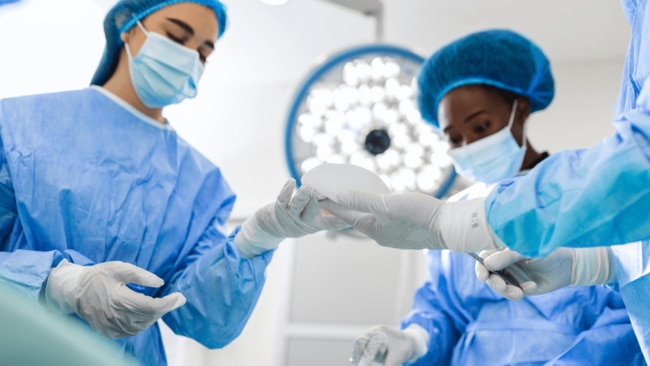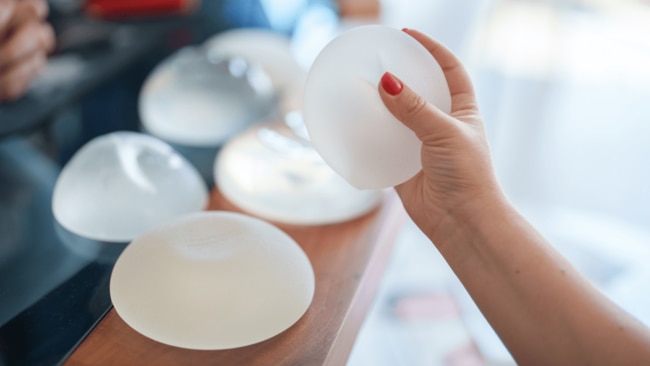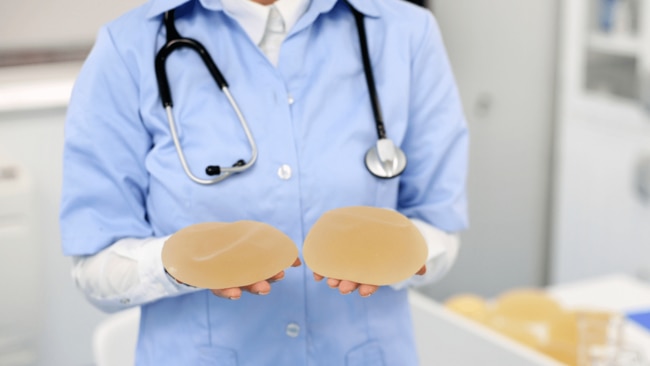Breast implants don’t need to rupture to cause illness
It’s important to know the signs

Lifestyle
Don't miss out on the headlines from Lifestyle. Followed categories will be added to My News.
Breast implant illness has come to the fore in recent years, with the debilitating symptoms leading to an increased number of women having explant surgery.
Each year, around 20,000 Australian women have breast implant surgery for reconstruction due to cancer or for enhancement purposes. Afterwards, some notice a constellation of symptoms dubbed breast implant illness, or BII.
These may emerge immediately after surgery or months or years later and include fatigue, shortness of breath, joint and muscle pain, dry eyes, headaches, hair loss, rashes, gastrointestinal issues, brain fog, and more.
Medical experts are unsure of the exact causes of breast implant illness but suspect some patients are predisposed to an immune reaction to the implant materials, with the body reacting to the consequent inflammation.
Like what you see? Sign up to our bodyandsoul.com.au newsletter for more stories like this.
Cases aren’t restricted to patients whose implants have ruptured, says Dr Alia Kaderbhai, GP and chair of the RACGP Specific Interests Breast Medicine network.
“The exact causes are still unknown and being investigated,” she says. “We do know it can occur with any type of implant and it does not necessarily mean the implant has ruptured. We are seeing this illness in implants that are intact.”
Treatment generally involves taking out the implants and a capsulectomy, the removal of the scar tissue that has formed around the implant. However, getting to that point can be a long road of inconclusive tests and ruling out other potential causes.
Professor Anand Deva is the head of Cosmetic Plastic and Reconstructive Surgery at Macquarie University. He and a team of researchers have been studying the symptoms of BII to better understand the condition. The initial findings have been promising. “At six months and after having enrolled over 200 women, I can say that breast implant removal and capsulectomy results in a significant reduction in the number and severity of these symptoms,” he says.

“There are no specific diagnostic criteria as yet, as the condition is yet to be officially recognised as a medical condition,” says Deva. “We hope by documenting the range of symptoms, the association with any implant-related complications, and more importantly the progress of these women after implant removal and capsulectomy, that we can provide more objective diagnostic criteria.”
Professor Deva says it’s important to rule out symptoms being caused by other illnesses. “All patients need to undergo thorough clinical evaluation to exclude things like autoimmune disease such as lupus or rheumatoid arthritis, iron/thyroid deficiency, and Vitamin D deficiency, amongst other disease before proceeding with any surgical treatment.”
As with other chronic illnesses, there is a link to anxiety and depression, says Deva. “Our latest paper has looked at the possible role of inflammation (for example, from chronic infection) combined with psychological symptoms such as anxiety and depression, which act as amplifiers for physical symptoms.”
The combined effects of mental and physical symptoms can be debilitating and the road to diagnosis can be a frustrating process.
Television host and author Andi Lew experienced breast implant illness due to an undetected rupture in her left implant, which felt different to the right one from when it was first inserted. Six surgeons and an MRI all told her there was no issue before she found a doctor who took her symptoms seriously.
“It was one of those things that I knew others were suffering, but I never knew that it would happen to me, and I didn’t know how deep the suffering was until I started joining the dots,” says Lew.
There was a severe impact on her lifestyle across the board. “It impacted my ability to earn, to concentrate, my ability to have any kind of relationship, and my relationship with myself was terrible because I actually thought I was going crazy when deep down inside I knew that there was something wrong.”

She had an explant - or implant removal - and capsulectomy surgery earlier this year and is happy with the results.
“After my removal, I felt instantly better,” Lew says. “The weight was literally off my chest. All the inflammation started to decrease within days.”
She has now written a book about nurturing women through their explant journey, which will be available in October in bookstores across Australia.
Elisha Casagrande was in the dark about breast implant illness when she began to experience symptoms of the condition four years after her implant surgery. Two years later, she noticed the rapid onset of capsular contracture, which is where scar tissue surrounding the implant hardens and squeezes the implant.
“I couldn’t lift my hands above my head, lie on my belly or my side, and my breasts were incredibly hard & sore,” she says. “This is when I made the decision to have them removed.”
She had her implants removed before she understood that there was a name for the illness she had experienced.
“I heard the term ‘breast implant illness’ roughly two years after my explant surgery,” she says. “I had already undergone explant surgery to remove my implants before becoming aware that there was an actual diagnosis for the condition I had experienced. I was never informed about the risks of breast implant illness, not before my surgery nor during the years when my symptoms were at their worst.”
Casagrande now feels much better since having her implants removed.
“My immune system has drastically improved, I no longer have any auto-immune type systems, coincidentally clothes look better now than they ever did with implants, I have far greater upper body strength and I can now lie comfortably in bed at night which has improved sleep quality and my energy levels throughout the day,” she says.
With raised awareness, implant patients will be armed with an enhanced knowledge of what the symptoms are if they arise. Through further research to understand the causes and best treatments, medical staff will be able to reach a diagnosis faster and improve outcomes for patients.
“GPs should be aware of breast implant illness as a condition and the range of symptoms involved,” says Dr Kaderbhai. “Any woman with breast implants who displays a new onset of symptoms such as brain fog, poor concentration, unusual rashes, new-onset respiratory illness and joint aches should be thoroughly investigated, and we should have breast implant illness in the back of our minds.”
More Coverage
Originally published as Breast implants don’t need to rupture to cause illness




